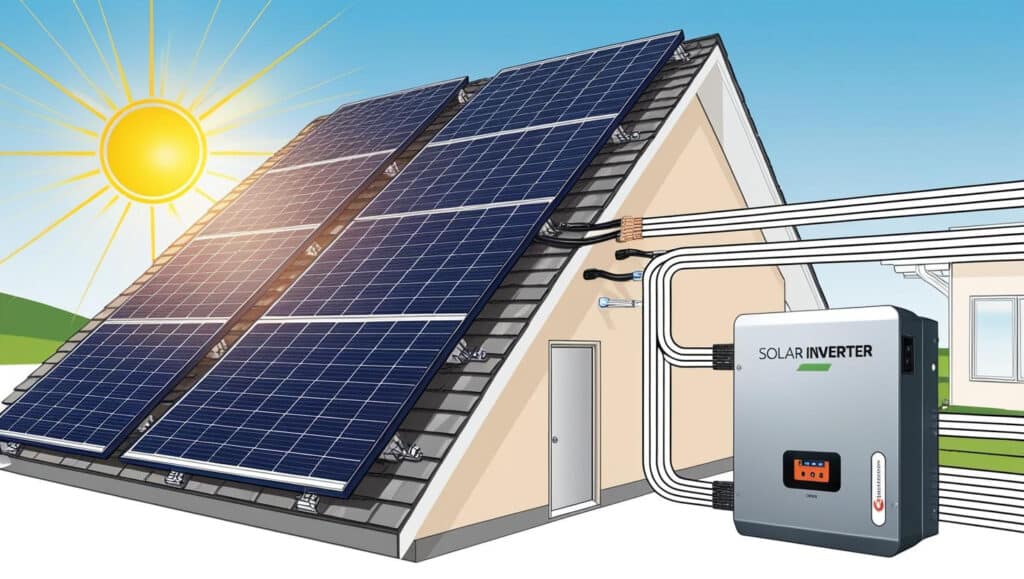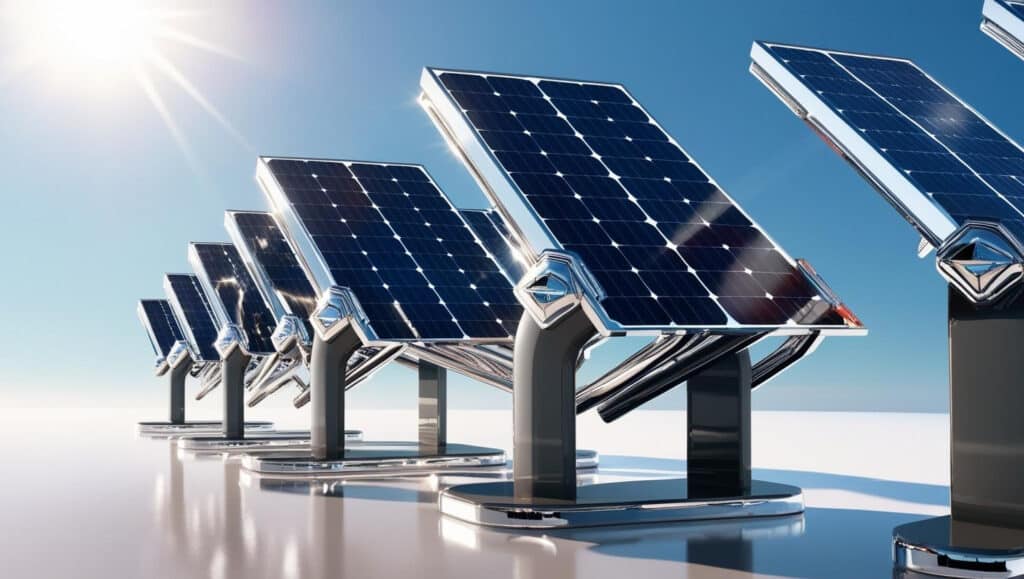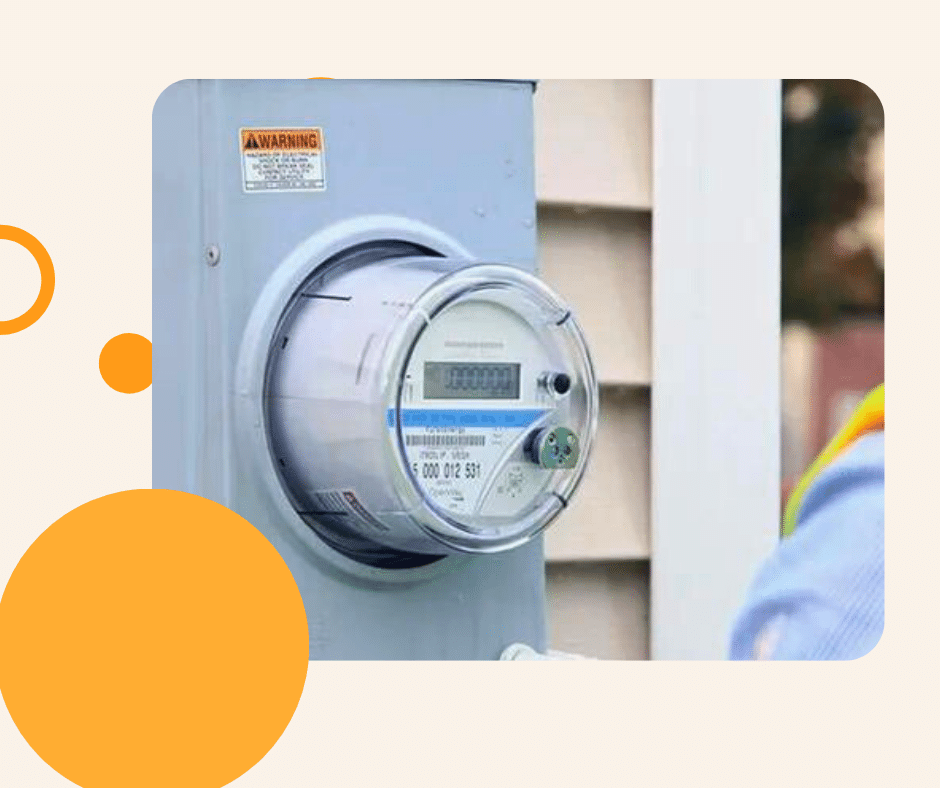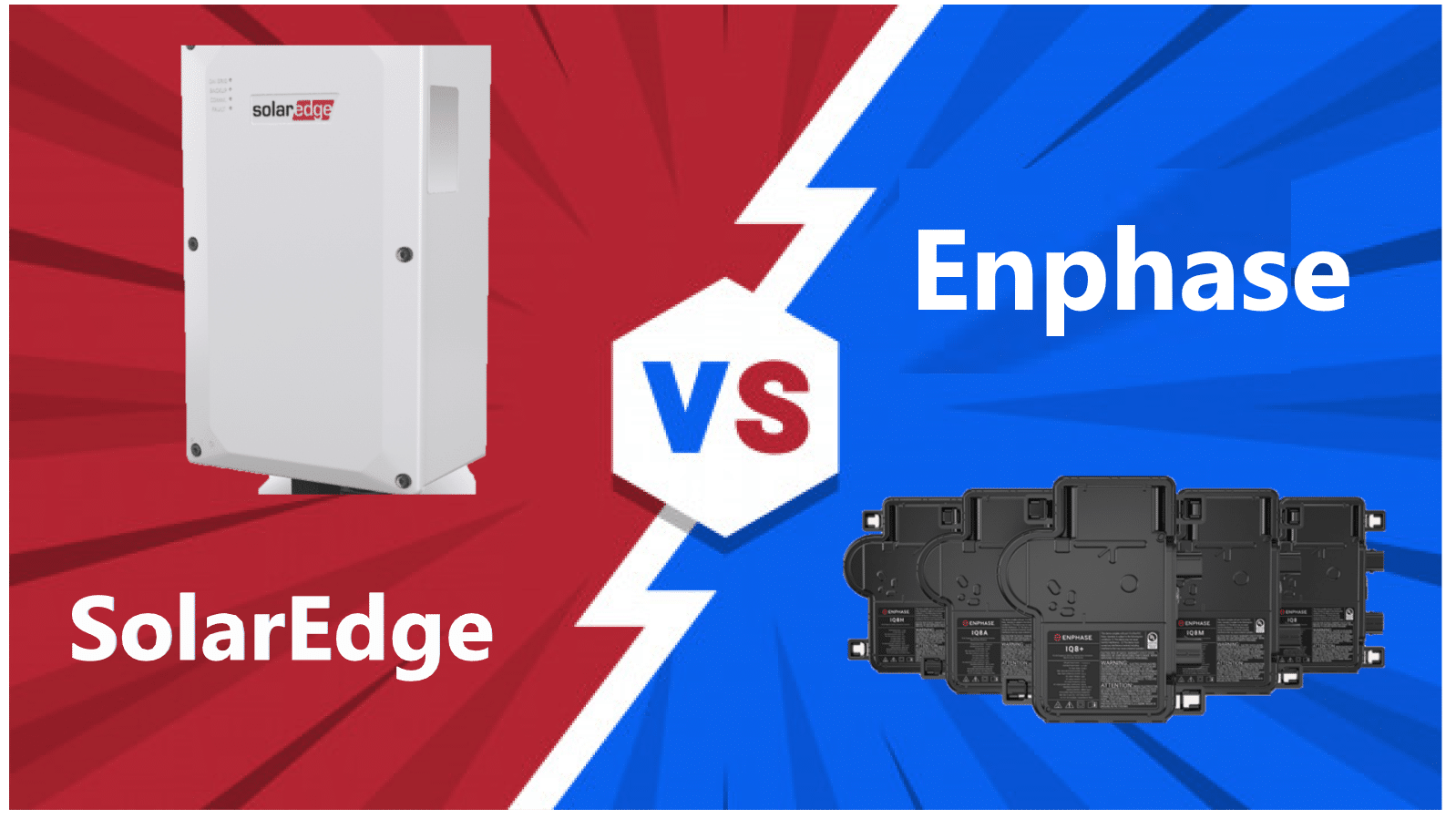Key Takeaways
- Assessing your energy needs is crucial for a successful transition to solar, ensuring that your system is tailored to provide long-term savings and sustainability.
- Choosing the right solar system—roof-mounted, ground-mounted, or solar carports—can maximize energy efficiency and align with your business’s unique infrastructure and goals.
- Investing in solar energy not only leads to significant cost savings and tax incentives but also enhances your business’s reputation for environmental responsibility.
As businesses worldwide strive to reduce costs and embrace sustainability, transitioning to solar energy has become an increasingly attractive option. This comprehensive New Year’s Guide: Transitioning to Solar Energy for Your Business is designed to help you navigate the shift to solar power, offering insights into assessing your energy needs, selecting the right solar technology, and understanding the financial benefits.
By investing in solar panels and renewable energy systems, businesses can not only achieve significant cost savings but also enhance their reputation for environmental responsibility. This guide provides everything you need to make an informed decision, ensuring a smooth transition to a greener, more sustainable future.
Assess Your Business’s Energy Needs
Before you switch to solar energy, evaluate your current energy supply and anticipate future needs. This evaluation forms the foundation of a successful transition, ensuring that your solar energy system is tailored to meet your specific requirements. Switching to solar power is a long-term investment that not only offers financial benefits but also reduces your business’s carbon footprint.
Optimizing the benefits of solar energy starts with understanding your energy usage. Identifying challenges related to energy costs and consumption helps manage electricity bills and reduce overhead costs.
Additionally, a solar benchmarking estimate can provide critical information such as the number of solar panels your property can accommodate, projected electricity production, and potential savings.
Understanding Solar Energy Systems

Solar energy systems come in various forms, each suited to different business needs and environments. The three main types of commercial solar systems are roof-mounted, ground-mounted, and solar carports. Roof-mounted systems offer cost-effectiveness and efficient use of rooftop space, making them ideal for many businesses.
Ground-mounted solar installations offer the advantage of optimal energy production by avoiding shading and allowing for the perfect orientation of solar panels. These systems are particularly beneficial for businesses with ample land space.
On the other hand, solar carports serve a dual purpose by providing shaded parking for vehicles while generating solar energy. Although more expensive due to their taller structures, they are an excellent solution for urban businesses with limited roof space.
These options help you decide on the type of solar system that best suits your business’s energy needs and space constraints. Each system, be it roof-mounted panels, ground installations, or solar carports, offers unique benefits that contribute to overall energy efficiency and sustainability goals. If you choose to install solar panels, you can enhance your energy strategy further.
Financial Benefits of Solar Energy

Transitioning to solar energy offers substantial financial benefits. On average, commercial properties spent approximately $156,010 on energy costs over 20 years before switching to solar. By investing in solar power, businesses can significantly reduce their electricity bills, sometimes by as much as 75%. This can translate into potential savings exceeding $100,000 over two decades. Furthermore, adopting solar energy enhances the financial standing of businesses through reduced energy costs and various incentives.
Besides direct savings on electricity bills, businesses can benefit from tax incentives and credits, further offsetting the initial cost of solar installations. The following subsections will delve deeper into these financial aspects, highlighting the specific benefits and opportunities available to businesses.
Tax Incentives and Credits
One of the most significant financial incentives for businesses investing in solar energy is the Federal Investment Tax Credit (ITC). Businesses can receive a 30% tax credit on the upfront cost of solar systems. This program is available until 2025. Leveraging this tax credit allows businesses to deduct a substantial portion of their solar installation costs from federal taxes, making solar energy more affordable.
In addition to the ITC, various state and local incentives, including rebates, can reduce installation costs by nearly 70%. The Inflation Reduction Act of 2022 has also allocated $369 billion towards climate initiatives, significantly impacting the solar market and making renewable energy projects more accessible.
Such solar incentives make commercial solar energy a viable and attractive investment for businesses.
Long-Term Savings
Solar energy systems offer significant long-term savings beyond immediate financial incentives. Businesses can save over $100,000 in electricity costs over 20 years by transitioning to solar power. Such substantial reductions in operating costs help businesses achieve energy independence, shielding them from price fluctuations in traditional energy sources.
Solar installations provide predictable electricity costs, protecting businesses from rising energy prices and billing spikes. Most companies recoup their initial investment within a few years, ensuring a quick return on investment. The long-term financial advantages of solar energy include significant savings, quick returns, and protection from future cost increases.
Choosing the Right Solar Technology

Choosing the right solar technology maximizes the benefits of your solar energy system. Businesses should consider their specific energy needs, available space, and financial constraints when choosing a solar solution. Tailored proposals catering to these needs can significantly enhance energy efficiency and overall performance.
Innovations in solar technology, such as higher efficiency panels and optimized placement, are driving increased accessibility and performance. Financing options like solar loans and Power Purchase Agreements can also facilitate the transition to solar energy, making it more financially viable for businesses of all sizes.
Photovoltaic Panels vs. Solar Carports
Weigh the respective benefits and applications when choosing between photovoltaic panels and solar carports. Designed for high efficiency and power output, photovoltaic panels suit various business applications. They are particularly effective for businesses with adequate roof space for installation.
Solar carports, on the other hand, offer dual functionality by providing shaded parking while generating solar energy. This option is ideal for urban businesses with limited roof space but ample parking areas.
Your specific energy needs, available space, and business context will determine the choice between the two.
American-Made Solar Panels
Investing in American-made solar panels ensures higher quality and adherence to stringent domestic manufacturing standards. These panels also reduce lead times in supply chains, leading to faster project completion.
Sun Source Energy uses top-rated American-made Qcell solar panels, providing businesses with reliable and efficient solar energy solutions.
Partnering with a Reliable Solar Installer

A reliable solar installer is crucial for successfully implementing solar energy systems. Here are some key factors to consider when selecting a solar contractor:
- Expertise in solar installation
- Certifications like NABCEP
- Necessary licenses
- Insurance to ensure the installer can manage the electrical components of the system safely
Verify the track record of potential installers by reviewing past installations and client testimonials. A reputable solar installer provides comprehensive service from initial consultation to final installation, ensuring a smooth transition to solar energy for your business.
Why Choose Sun Source Energy
Sun Source Energy stands out as a top choice for businesses looking to transition to solar energy. Headquartered in Las Vegas, Nevada, Sun Source Energy installs commercial solar systems anywhere in the country. They also offer residential installations nationwide, ensuring a broad reach and comprehensive service.
Sun Source Energy uses top-rated hardware and American-made solar panels, providing high-quality and reliable solar solutions. With a strong track record and a commitment to customer satisfaction, Sun Source Energy is your trusted partner in achieving energy efficiency and sustainability goals.
Begin your renewable energy journey by contacting Sun Source Energy today.
Installation Process
The installation process for solar energy systems begins with a thorough site evaluation conducted by the solar contractor. This assessment ensures that the solar system is optimized for energy production based on specific site conditions. The contractor will evaluate factors such as roof condition, shading, and orientation to design the most efficient system possible while installing solar panels.
After the site evaluation, the next steps involve securing the necessary permits and approvals for the solar generating system to operate. Once all permits are in place, the installation process proceeds, ensuring that the system is installed safely and efficiently. The entire process is managed by the solar installer, providing a hassle-free experience for the business.
Maximizing Energy Efficiency
Maximizing energy efficiency is essential when integrating a solar energy system into your business. Simple measures, such as swapping old incandescent lighting for CFL or LED bulbs, can significantly improve energy efficiency. Regular maintenance is necessary since obstructions like dirt, leaves, and snow can hinder the ability of solar panels to generate electricity.
An energy storage system alongside your solar panels allows your business to store excess energy for emergencies, enhancing energy management and efficiency. Resources such as the Business Energy Guide and Third-Party Energy Efficiency Programs help identify additional energy-saving solutions.
The following subsections will provide more details on conducting energy audits and implementing smart energy management systems.
Energy Audits
Conducting energy audits is a valuable step in identifying areas of inefficiency and opportunities for energy savings. A systematic evaluation of your energy usage through an audit can pinpoint areas where energy can be conserved, optimizing solar system performance and reducing overall energy costs.
Smart Energy Management
Smart energy management systems significantly enhance the efficiency of your solar energy setup. These systems monitor the performance of solar panels in real-time, allowing businesses to optimize energy use and enhance savings. Integrating smart technology ensures your solar energy system operates at peak efficiency, maximizing your investment benefits.
Smart energy management includes automated controls and data analytics, helping identify patterns and make informed energy consumption decisions. This innovative approach not only improves energy efficiency but also contributes to substantial cost savings and sustainability goals.
Maintenance and Upkeep of Solar Systems
Regular maintenance and upkeep are crucial to ensure optimal energy production and longevity of solar systems. Solar panels typically require minimal upkeep due to their lack of moving parts, but periodic checks are essential to identify any potential issues early on. Regular monitoring and maintenance help maintain peak efficiency and prolong the lifespan of commercial solar systems.
The following subsections will detail the importance of routine inspections and the best practices for cleaning and repairs, ensuring your solar system remains in top condition.
Routine Inspections
Routine inspections ensure the optimal performance of solar energy systems. Annual energy audits help evaluate system performance and identify potential issues before they escalate into costly repairs. Regularly checking the inverters is crucial since they convert the energy generated by the panels.
Inspecting wiring and looking for signs of corrosion, especially in coastal areas, enhances the reliability and safety of your solar energy system. A routine inspection schedule can significantly extend the life of your solar panels and ensure a sustainable energy solution for your business.
Cleaning and Repairs
Regular cleaning is essential to maintain the performance and efficiency of solar panels over time. Using a soft-bristled brush and hose attachment is recommended for safely cleaning the panels without causing damage. It’s best to clean the panels during cooler temperatures, either in the morning or late afternoon, to avoid thermal stress on the glass surfaces.
Promptly addressing minor repairs prevents further damage and maintains the efficiency of your solar system. Regular maintenance and timely repairs ensure that your solar panels continue to provide reliable and efficient clean energy for your business.
Environmental Impact and Corporate Responsibility
Adopting solar energy benefits your business financially and demonstrates a strong commitment to environmental responsibility and sustainability. Choosing American-made solar panels supports local manufacturing, contributing to the economy and job creation. Installing solar power shows dedication to responsible business practices and environmental protection.
The next subsections explore the environmental benefits of reducing your business’s carbon footprint and how adopting solar energy can enhance your business reputation among sustainability-focused consumers.
Reducing Carbon Footprint
One of the most significant environmental benefits of solar energy is its ability to reduce carbon emissions. A 100kW solar PV system can prevent approximately 3,227 metric tons of CO2 emissions over 25 years, showcasing its substantial impact on reducing greenhouse gases. Reducing carbon emissions helps businesses meet environmental regulations and enhance sustainability initiatives.
Adopting solar energy allows businesses to contribute positively to their sustainability goals. Significantly lowering their carbon footprint allows businesses to comply with regulations and improve their reputation among eco-conscious consumers.
Enhancing Business Reputation
Commitment to renewable energy elevates a company’s image and attracts environmentally conscious clientele. Using solar energy improves public image, as consumers increasingly favor companies demonstrating environmental responsibility. Renewable energy solutions enhance a company’s visibility and appeal among eco-conscious consumers.
Commitment to renewable energy differentiates a business from its competitors and enhances customer loyalty. Many businesses find sustainability efforts not only benefit the environment but also result in increased customer satisfaction and loyalty.
Future Trends in Commercial Solar Technology

The future of commercial solar technology is bright, with ongoing advancements set to revolutionize the industry. Utilizing solar energy significantly reduces greenhouse gas emissions, aiding in climate change mitigation. The transition to solar energy supports sustainability goals and positions businesses as environmentally responsible leaders.
The next subsections delve into emerging technologies in solar energy and the market growth and opportunities they present for businesses.
Emerging Technologies
Emerging technologies in solar energy drive increased efficiency and versatility. Bifacial solar panels, capturing sunlight from both sides, are becoming increasingly popular in commercial applications due to their enhanced energy output. Flexible solar panel are gaining traction, allowing versatile applications on various surfaces, including clothing and vehicles.
Floating solar farms use sun-tracking technology to maximize sunlight capture, addressing the challenge of sunlight variability. These technological advancements increase efficiency and integration into various applications, making solar energy more accessible and effective for businesses.
Market Growth and Opportunities
The demand for solar energy and technological advancements are expected to drive significant market growth in the solar energy sector and create new business opportunities for a solar project. The growing use of smart technologies in solar energy systems optimizes performance and increases their appeal for commercial investments.
As more businesses adopt solar energy, the market for solar technology expands, offering numerous opportunities for innovation and growth. Investing in solar energy supports sustainability goals and positions businesses as leaders in the renewable energy sector.
Summary
In summary, transitioning to solar energy offers numerous financial, environmental, and reputational benefits for businesses. By assessing your energy needs, understanding solar technology, and leveraging financial incentives, you can make an informed decision that aligns with your sustainability goals.
Choosing the right solar technology and partnering with a reliable installer like Sun Source Energy ensures a smooth transition and long-term success.
Embrace the future of renewable energy and take the first step towards a sustainable and profitable future for your business.
Contact Sun Source Energy today to explore your options and join the growing community of businesses committed to clean, renewable energy solutions.
Frequently Asked Questions
How much can my business save by switching to solar energy?
Switching to solar energy could save your business over $100,000 in electricity costs over a span of 20 years. Embracing solar not only reduces expenses but also contributes to a greener future!
What financial incentives are available for installing solar energy systems?
You can significantly reduce the cost of installing solar energy systems through the Federal Investment Tax Credit, which offers a 30% tax credit on upfront costs, alongside additional state and local incentives. This makes going solar more accessible and affordable!
How do I choose the right solar technology for my business?
Choosing the right solar technology for your business hinges on evaluating your energy needs, available space, and budget. By focusing on options like photovoltaic panels or solar carports, you can find a solution that aligns perfectly with your unique situation!
What maintenance is required for solar panels?
To keep your solar panels performing optimally, ensure regular inspections and cleaning, along with periodic checks on the wiring and inverter. This simple maintenance will help maximize their efficiency and longevity!
How does adopting solar energy impact my business’s reputation?
Adopting solar energy significantly boosts your business’s reputation by showcasing your commitment to sustainability and attracting eco-conscious customers. It’s a smart move that sets you apart from competitors and strengthens your brand image!






